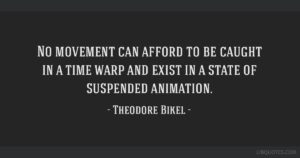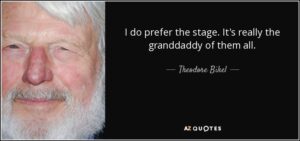Theodore Bikel, the legendary actor, folk singer, and activist, was a man of many talents whose words carried wisdom, wit, and passion. Bikel’s career spanned decades and made him a beloved figure in music, theater, and film. He was born in Vienna in 1924. He was best known for playing Tevye in Fiddler on the Roof and for his dedication to preserving folk traditions through music. Bikel’s quotes reflect his deep commitment to culture, social justice, and artistic expression.
He once said, “I have always striven to raise the voice of song against the voice of tyranny.” This encapsulated his belief in using art as a means of resistance and hope. Another notable quote, “No heirloom of humankind captures the past as do art and language,” highlights his passion for storytelling and preserving heritage. In addition to his artistic accomplishments, Bikel was a vocal supporter of human rights and opposed oppression and injustice. His legacy is one of creativity, courage, and a deep love for humanity. Through his words and works, he continues to inspire artists, activists, and those who believe in the power of culture to change the world.
Early Life and Birth
Theodore Bikel was born on May 2, 1924, in Vienna, Austria, to a Jewish family. His birth name was Theodor Bikel. His early life was marked by the rise of Nazi Germany and the escalating threat of the Holocaust. As a young boy, Bikel witnessed the growing dangers in Europe, and his family, fearing for their safety, fled to Palestine in the mid-1930s. This experience profoundly shaped his worldview and later informed his commitment to activism and human rights.

The family settled in Tel Aviv, where Bikel’s education began. His early exposure to the arts, especially music and theater, played a crucial role in shaping his career. He learned to play the violin and began performing in local productions, an early indication of his natural talent and passion for the arts.
Education
Bikel continued his education in Palestine and later studied at the Royal Academy of Dramatic Art (RADA) in London, where he trained as an actor. His formal education in theater provided him with a solid foundation in acting, which would later serve him well in a successful career on stage and screen.
In addition to his formal studies, Bikel was deeply influenced by his experiences in Europe and the Middle East. His time in Tel Aviv and exposure to the complexities of life in a region marked by political upheaval would continue to inspire much of his artistic work and advocacy.
Career and Profession
Theodore Bikel’s career was marked by an extraordinary range of accomplishments, from theater and film to music and activism. He was an accomplished actor, singer, composer, and activist. His professional journey began in the theater, where he quickly gained recognition for his powerful performances. One of his most iconic roles was that of Captain von Trapp in the original Broadway production of The Sound of Music (1959), which catapulted him to fame. His performance in this role was a highlight of his career, and it became a defining moment in the world of musical theater.
Bikel also enjoyed a long and varied career in film and television. He appeared in numerous films, including The African Queen (1951), My Fair Lady (1964), and The Defector (1966), as well as in television shows like The Twilight Zone, Star Trek: The Next Generation, and The Simpsons. His work in film and TV was just as diverse as his stage performances, showcasing his incredible versatility as an actor.
In addition to acting, Bikel was also a talented musician and singer. He was fluent in multiple languages and performed a wide variety of folk music from around the world, including Jewish, Yiddish, and folk songs. His love for music was not just limited to performance; he was also a composer and arranger, and he recorded many albums throughout his career.
Success and Recognition
Throughout his career, Theodore Bikel earned critical acclaim and recognition for his wide-ranging contributions to the arts. He was a Tony Award nominee and Emmy Award nominee, and his work in theater, film, and television earned him respect in each of these fields. His role in The Sound of Music was a key part of his success. Still, he also gained recognition for his international music career, which included performances in Yiddish, Hebrew, English, and other languages.

Bikel’s versatility also extended to his political activism. A staunch liberal, he was deeply involved in advocating for human rights and social justice causes throughout his life. He was an outspoken critic of the Vietnam War and supported a wide variety of civil rights movements. He worked closely with organizations such as Amnesty International and Human Rights Watch. Bikel’s activism extended to Jewish causes, and he was particularly passionate about Israel and Jewish identity.
Personal Life, Habits, and Favorite Things
Bikel’s personal life was just as dynamic as his professional career. He married twice, first to Ruth Klinger in 1948 (they divorced in 1956) and later to Miriam Bikel, with whom he had a long and happy marriage. Throughout his life, Bikel was deeply committed to his family and to his Jewish heritage, which played a central role in his personal and professional identity.
Bikel loved travel and spent much of his life on the road, whether performing in theater productions or touring with his music. His interests were wide-ranging, from his lifelong passion for Jewish history and culture to his love of classical music and literature. He was also an avid reader, especially of works related to politics, history, and philosophy.
His habits were those of a dedicated and disciplined artist. He took his craft seriously and was known for his attention to detail in every role he played. He worked tirelessly on his music and performances, and even in his later years, he remained active both in the arts and in political advocacy. His love for storytelling extended beyond the stage and screen—he was a natural-born storyteller known for sharing personal anecdotes from his own life and experiences.
Death and Legacy
Theodore Bikel passed away on July 21, 2015, at the age of 91, in Los Angeles, California. His death marked the end of an era for the arts community, as he had spent decades contributing to every aspect of theater, film, and music. Bikel’s legacy is multifaceted, as he left behind a vast body of work that continues to inspire new generations of artists, musicians, and activists.

Bikel’s contributions to Jewish culture, his advocacy for human rights, and his dedication to promoting peace and justice around the world remain a lasting testament to his character and beliefs. His ability to combine artistic talent with political and social activism ensured that he was not only a beloved figure in the entertainment world but also a voice for change in the real world.
Selected Quotes
- “Music is the universal language. It can transcend barriers, create understanding, and unify people.”
- “I’m interested in life and people in every aspect. The role of an artist is to be able to reflect that.”
- “Theater can change the world, one audience at a time.”
Frequently Asked Questions
Who was Theodore Bikel?
He was an actor, folk singer, and activist known for his roles in theater and film and his advocacy for human rights.
What is one of Theodore Bikel’s most famous quotes?
“I have always striven to raise the voice of song against the voice of tyranny.”
What was Bikel’s most famous acting role?
He was best known for playing Tevye in Fiddler on the Roof on stage.
What did Bikel say about preserving culture?
“No heirloom of humankind captures the past as do art and language.”
How did Bikel contribute to folk music?
He performed and recorded numerous folk songs from different cultures, keeping traditions alive.
Was Bikel involved in activism?
Yes, he was a strong advocate for human rights, particularly in civil rights and Jewish causes.
How did Bikel view the role of art in society?
He believed art was a powerful tool for storytelling, cultural preservation, and social change.
What was his stance on oppression?
He used his voice and platform to fight against oppression and injustice worldwide.
Why are his quotes still relevant today?
His words inspire artists, activists, and those who value culture, history, and justice.
What is Theodore Bikel’s legacy?
He left a lasting impact as an artist, musician, and advocate for human rights and cultural preservation.
Conclusion
Theodore Bikel’s legacy extends beyond his performances in film and theater—his words and actions made a lasting impact on culture, activism, and human rights. He believed in the power of art to preserve history and inspire change, using his voice to challenge injustice and oppression. His statement, “I have always striven to raise the voice of song against the voice of tyranny,” encapsulates his deep commitment to using music and storytelling as forces for good.
